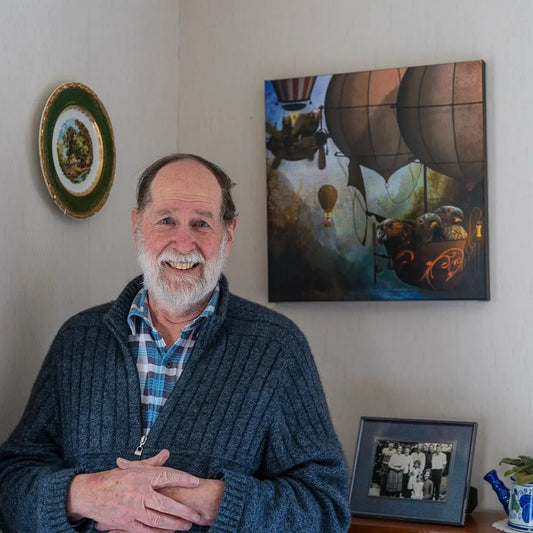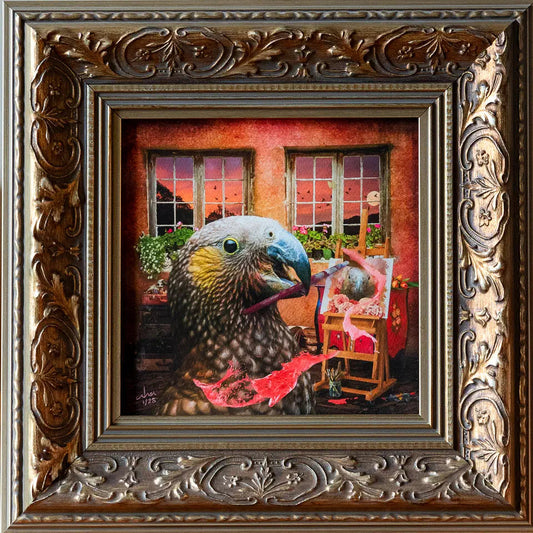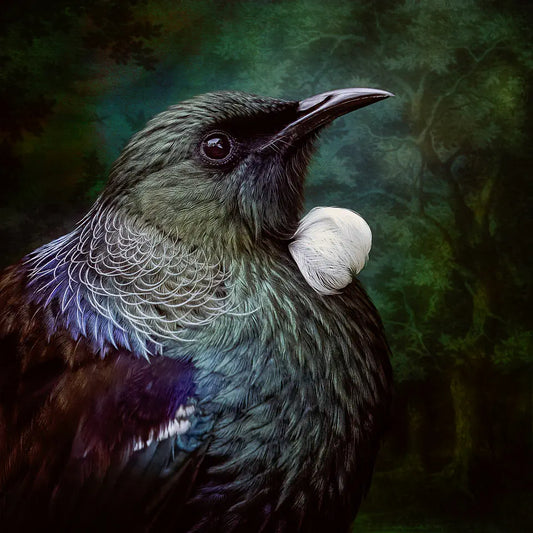"A Quick Study" - an artwork from my Flights of Fancy series that explores themes of conservation and cognition. I'll let you into a secret - this wee toutouwai is reading my PhD thesis (which took 8 years to complete - definitely not a quick study - the joke is on me!). This toutouwai is one of approximately 10 intelligent beings that have likely read it too! All the graphs are measurements in my ears showing how well (or not) I'm detecting samples of white noise.
I've been thinking a lot lately about the similarities between art and science. I started life as an artist, but due to an unfortunate event (a story for another day) in my teenage years, I ended up focusing on science for a few decades. It's been only recently that art has filled a large part of my life again. I often bump into the attitude that it's unusual to be both an artist and a scientist, but is it?
There is a pervasive (and disproved) theory that people are either left or right-brain dominated, and this somehow determines whether someone is artistically or analytically inclined. I reckon the underlying premise that art needs only a creative mind and science needs only an analytical mind is wrong in the first place. A good artist or scientist needs to be both - innate curiosity and creativity and technical hard work and skill underlie both endeavours. Without the "what if...", neither art nor science happens. And without the "how do I..." problem-solving neither art nor science progresses. The actual moment of creative and imaginative thought underlying a theory or artwork is often fleeting and cannot be forced, often happening during deep relaxation (famously in the bath for Archimedes). But for both artists and scientists, most of our time is spent in planning and execution requiring techniques that take knowledge, training, and years of practice.

I love photoartistry, but for years I've wished I could be more proficient at drawing and painting. But being decades behind where I would have been had I continued as a child put me off even trying. I eventually realized that all these talented young artists had as much experience as me and they were getitng on with it. So I got over myself and got to work! I'm not sure why I was drawn to watercolour - one of the more difficult styles of painting - but I was and I'm thoroughly enjoying the learning process.
"Misty Morepork" is one of my favourite pieces, and I was stoked to have it accepted for exhibition with the NZ Academy of Fine Arts!
It's also not that unusual for people to pursue both creative and analytical hobbies and jobs. Many of my scientific colleagues are also accomplished musicians, artists, writers, and actors. Most artists also have a day job (though we all dream of the day we can do art full-time!). We also all know people who say "I can't draw" or "I can't work with numbers." Sometimes people do have actual learning difficulties in certain areas, but for many - if we're truly honest with ourselves - it's not so much "can't" but more a case of "I don't want to." It may be we don't want to put the time and work in to learn or we don't want to feel the fear of failure or being judged (on closer examination, often due to a negative experience as a kid). It takes a certain relaxation of internal barriers to give yourself permission to try something new. A truer statement is "I choose not to" (which is fine, but let's be honest eh!). I admit to choosing not to do many things (public speaking and singing, learning a second language, driving a car).
And even if you do overcome those fears and put a bit of yourself out into the world - some people are going to hate it! And this is where science and art diverge. In trying to uncover the truths of nature, science can be wrong (and given there are always unknowns, we can only ever approximate the truth so it's more a degree of wrongness). Through grueling scientific peer review, we are trained to find how many ways wrong a scientific work might be - it can be rather soul-sapping regardless of which side of the process you're on. What's so liberating with art is there is no right or wrong - and the subjective experience of art is totally out of my control and it is totally out of your control too. Your reaction of love, hate, or indifference comes from your current state of mind and your lived experiences that have shaped who you are. Having put both art and science out into the world, I know which causes me more anxiety! (Like most people, I hate being proven wrong.) But if you don't like my art, that's totally fine.

Most of my favourite pieces are in my "Flights of Fancy" series, where I let imagination take over. These pieces often start with the thought "What if....". The themes and messages I include in these pieces might not be what you take away from them - I love how art can do that!
This subjectivity is also why artists should strive to create art that first and foremost satisfies themselves. The art that I create that resonates the most deeply with me is shaped by my lived experiences that draw me to certain subjects, colours, and compositions and "what if's..." I'm not always consciously aware of what they are. It is only over time and on reflection that I see themes coming through in my art from my unique background in psychological research and experiences as a wildlife volunteer - themes of intelligence and cognition in non-human species (birds are really smart), themes of environmental devastation, and the effects of human colonisation. Sometimes a pretty bird is just a pretty bird and brings joy to us all - and that's not to be underrated. But the pieces that mean the most to me have a deeper message that I didn't necessarily even realize as I created them. Artists worry a lot about whether they have a cohesive style and theme, and it can be hard to articulate let alone recognize. But maybe it doesn't even matter. What someone else sees in my art is shaped by their experiences and might be something completely different - how cool is that!
If any of what I've written brings up thoughts or questions or resonates with you, I'd love to hear your thoughts - let rip in the comments below :)






